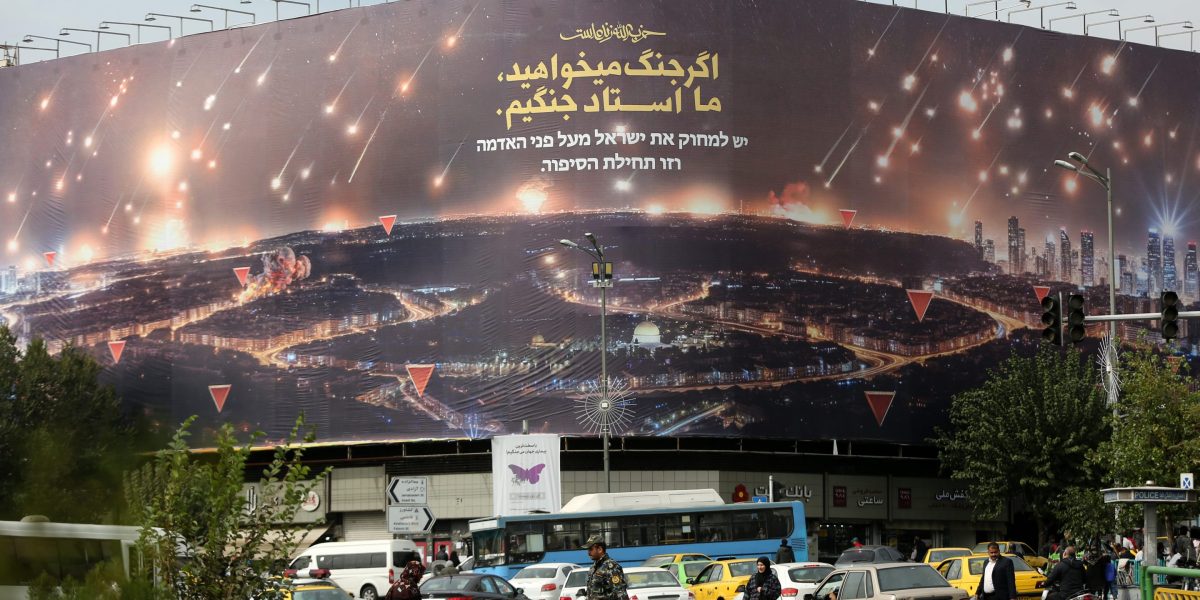Israel’s assault on Iran early Saturday, coordinated with Washington and limited to missile and air defense sites, was more restrained than many expected and may help diplomatic efforts to return hostages and limit the combat in both Lebanon and Gaza.
Israel held off until US Secretary of State Antony Blinken returned to Washington from four days of consultations with Israeli and Arab allies.
In a set of sorties under cover of darkness, and likely over hostile territories including Syria and Iraq, dozens of Israeli warplanes flew thousands of kilometers. Refueling in midair, they targeted military sites in three provinces in retaliation for Iran’s firing of ballistic missiles at Israel on Oct. 1.
Israel distributed videos of Prime Minister Benjamin Netanyahu and military chiefs coordinating from a defense ministry bunker, a rare acknowledgment of an attack on the Islamic Republic and an expansion of what has been until now mostly a shadow war.
But it avoided oil, nuclear and civilian infrastructure sites, in keeping with a request from the administration of US President Joe Biden, which is leading attempts to find solutions to the crises set off by the brutal attack on Israel a year ago from Iran’s proxy in Gaza, Hamas. Defense Minister Yoav Gallant said he was in close touch with US Defense Secretary Lloyd Austin throughout.
Israel’s restraint on Saturday allowed Iran to dismiss it as ineffective, possibly setting the stage for a restrained response or no response at all.
Iran’s First Vice President Mohammad Reza Aref, posted on his X account, “Iran’s power has humiliated the enemies of the motherland,” while state TV interviewed children going to school and people exercising. The official Tasnim news agency spoke only of “reserving the right to respond.”
Israeli spokesmen portrayed the attack in a different light, as evidence of its deep knowledge of Iran’s military outposts, its ability to hit anywhere in the country and to send a message to the regime in Tehran.
“The ball is now in the Iranian court,” Amos Yadlin, a former director of Israel’s military intelligence, said on Channel 12 even before the attack ended. The goal, he said, was to make clear what Israel is capable of doing.
The operation was codenamed “Days of Penitence,” a reference to the period in the Jewish calendar just ending and suggesting it was meant to bring about regret, a rethink and new resolutions — perhaps among friend and foe alike.
US regional allies like Saudi Arabia condemned the Israeli attack as a violation of Iranian sovereignty but the suspicion among Israeli officials was that Riyadh was comfortable with the level of Israel’s response.
Israeli political leaders to Netanyahu’s right and left criticized the assault as a missed opportunity to make a more substantial strategic point that exhibited what they have characterized as indecisiveness.
But others noted that Netanyahu’s harsh attacks on Lebanon’s Hezbollah in recent weeks have made a huge difference in restoring Israel’s deterrence, shattered by the Oct. 7 attack by Hamas which killed 1,200 people, with another 250 abducted.
Hezbollah has been shelling Israel for a year in solidarity with the Palestinians in Gaza, who’ve been under Israeli attack. Both organizations, considered terrorist groups by the US and others, say their goal is the destruction of the Jewish state.
Israel has not only sent troops into southern Lebanon but killed and wounded the group’s top leaders and eliminated many missile launchers and storage sites.
It has long been predicted that if Israel were to attack Iran, Hezbollah would fire thousands of long-range missiles at Israel’s population centers for weeks, causing serious damage and death.
So far, Hezbollah has been able to fire only a handful of such missiles. With the Hamas militia also heavily degraded, the threat from it is greatly reduced. Israel’s war on Hamas has killed some 42,000 Gazans, according to Hamas officials, who don’t distinguish between fighters and civilians. It’s also reduced much of the coastal strip to rubble in a war that’s been heavily condemned around the globe.
The US and other powers are trying to restore Lebanon’s army and political structure and move Hezbollah away from the border with Israel. They also hope to get the 100 or so Israeli hostages still held by Hamas back home and make arrangements for rebuilding and governing Gaza that excludes Hamas and the Israeli military.
Israel’s limited response on Saturday may accelerate those processes, including bringing in the United Arab Emirates and other Gulf nations into the rebuilding of Gaza, if a cease-fire can be worked out.
Little of significance is likely to happen now until the US presidential election on Nov. 5 — and Israel’s next steps will probably depend on whether Donald Trump or Kamala Harris wins.

